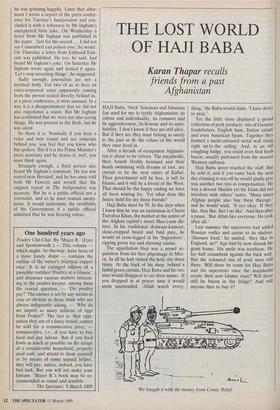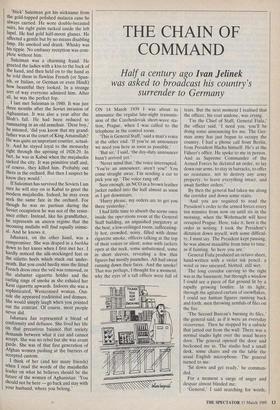THE LOST WORLD OF HAJI BABA
Karan Thapar recalls
friends from a past Afghanistan
HAJI Baba, 'Stick' Suleiman and Jahanara Jan used for me to typify Afghanistan: its colour and individuality, its romance and its aggressiveness, its honour and its unre- liability. I don't know if they are still alive. But if they are they must belong as surely to the past as do the values Eof the world they once lived in.
After a decade of occupation Afghanis- tan is about to be reborn. The mtijahedin, their beards freshly hennaed and their heads swimming with dreams of loot, are certain to be the next rulers of Kabul. Their government will be free, it will be Islamic and it will be a friend of the West. That should be the happy ending we have all been waiting for. Yet what does this future hold for my three friends?
Haji Baba must be 70. In the days when I knew him he was an institution in Charai Turrabaz Khan, the market at the centre of the Afghan capital's smart Shar-i-nau dis- trict. In his traditional shalwaar-kameez, close-cropped beard and bald pate, he would sit cross-legged in his 'Superstore', sipping green tea and chewing raisins.
The appellation Haji was a proud ac- quisition from his first pilgrimage to Mec- ca. In all he had visited the holy city three times. At the back of his shop, behind a faded green curtain, Haji Baba and his two sons would disappear to say their namaz. If you dropped in at prayer time it would seem unattended. 'Allah watch every-
thing,' the Baba would claim. 'I have dooty to pray.' Yet the little store displayed a proud collection of pork products: tins of German frankfurters, English ham, Italian salami and even American Spam. Together they formed a multi-coloured metal wall rising right up to the ceiling. And, in an old coughing fridge, you could even find fresh bacon, usually purloined from the nearest Western embassy. Haji Baba never touched the stuff. But he sold it; and if you came back the next day claiming it was off he would gladly give you another two tins in compensation. He was a devout Muslim yet his Islam did not interfere with others' tastes. 'Many times Afghan people also buy these theengs; and he would wink. 'It ees okay. If they like, they like. But I no like'. And then after a pause, 'But Allah like everyone. He look after all.'
Last summer the superstore had added Russian vodka and caviar to its shelves. `Shoruwi food,' he smiled, 'they like in England, no?' Age had by now shrunk his giant frame. His smile was toothless. He lay half recumbent against the back wall. But the coloured tins of pork were still there. Will there be room for Haji Baba and his superstore once the mujahedin create their new Islamic state? Will there still be bacon in the fridge? And will anyone dare to buy it?
We bought it with the money from Comic Relief.' 'Stick' Suleiman got his nickname from the gold-topped polished malacca cane he always carried. He wore double-breasted suits, his right palm tucked inside the left lapel. He had gold half-moon glasses. He affected a gentle but by no means disabling limp. He smoked and drank. Whisky was his tipple. No embassy reception was com- plete without him.
Suleiman was a charming fraud. He greeted the ladies with a kiss to the back of the hand, and then held on to the hand as he told them in flawless French (or Span- ish, or Italian, or German or even Hindi) how beautiful they looked. In a strange sort of way everyone admired him. After all, he was the perfect fop.
I last met Suleiman in 1980. It was just three months after the Soviet invasion of Aghanistan. It was also a year after the Shah's fall. He had been reduced to ruminating in an old armchair. 'Dear boy,' he intoned, 'did you know that my grand- father was at the court of King Amanullah? He was quite an important courtier, actual- ly. And he stayed loyal to the monarchy right through the uprising of 1928-29. In fact, he was in Kabul when the mujahedin sacked the city. It was primitive stuff and, of course, they killed him. Probably out there in the orchard. But then I suspect he knew they would.'
If Suleiman has survived the Soviets I am sure he will stay on in Kabul to greet the modern mujahedin. Indeed, he may even seek the same fate in the orchard. For though he was no partisan during the Soviet occupation he was not of the resist- ance either. Instead, like his grandfather, he represents an ancien regime that the incoming mullahs will find equally inimic- al. And he knows it.
Jahanara, on the other hand, was a compromiser. She was draped in a burkha down to her knees when I first met her. I hardly noticed the silk-stockinged feet or the stiletto heels which stuck out under- neath. But you could hardly miss the fitted French dress once the veil was removed, or the alabaster cigarette holder and the curling rings of smoke as she exhaled her Kent cigarette upwards. Indoors she was a sophisticated, Westernised woman. Out- side she appeared traditional and demure. She would simply laugh when you pointed out the contrast. Of course, most people never did.
Jahanara Jan represented a blend of conformity and defiance. She lived her life on that precarious balance that society demands between what it can and cannot accept. She was no rebel but she was avant garde. She was of that first generation of Afghan women pushing at the barriers of accepted custom.
I think of her (and her many friends) when I read the words of the mujahedin leader on what he believes should be the future of the women of Aghanistan: 'You should not be here — go back and stay with Your husband, where you belong.'



























































 Previous page
Previous page